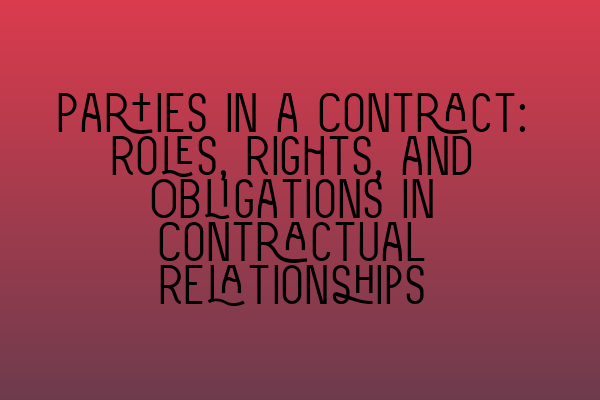Parties in a Contract: Roles, Rights, and Obligations in Contractual Relationships
Contracts are an integral part of business and legal transactions. They serve as a binding agreement between parties involved, outlining the rights, obligations, and responsibilities of each party. Understanding the roles and responsibilities of the parties in a contract is crucial for ensuring that both parties fulfill their contractual obligations and protect their rights. In this article, we will explore the various parties in a contract and their respective roles, rights, and obligations.
1. Offeror
The offeror is the party who initiates the contract by making an offer to another party, known as the offeree. The offeror has the right to set the terms and conditions of the contract and is responsible for ensuring that the offer is clear, definite, and communicated to the offeree. It is essential for the offeror to have a thorough understanding of the legal implications of their offer to secure a valid and enforceable contract.
2. Offeree
The offeree is the party to whom the offer is made. They have the right to accept or reject the offer presented by the offeror. If the offeree accepts the offer, a legally binding contract is formed, and both parties are obligated to fulfill their respective duties and responsibilities as outlined in the contract. It is important for the offeree to carefully consider the terms of the offer before accepting, as acceptance signifies their agreement to be bound by the terms of the contract.
3. Promisor
The promisor is the party who makes a promise or provides a performance as part of the contract. They are obligated to fulfill the promises or obligations stated in the contract. The promisor’s performance may involve providing goods, rendering services, or taking specific actions as outlined in the contract. Non-performance or breach of contract by the promisor may result in legal consequences, such as the payment of damages to the injured party.
4. Promisee
The promisee is the party to whom the promise or performance is made. They have the right to expect the promisor to fulfill their obligations as stated in the contract. The promisee’s main responsibility is to provide consideration, which may be in the form of payment, services, or anything else of value, in exchange for the promise or performance from the promisor. The promisee must also meet any other obligations stated in the contract to ensure the smooth execution of the agreement.
5. Beneficiary
In some contracts, there may be a third party involved who benefits from the performance of the contract but is not a party to the contract itself. This third party is known as the beneficiary. The beneficiary has the right to enforce the contract if it includes specific provisions allowing them to do so. It is essential for all parties involved to clearly define the rights and obligations of the beneficiary in the contract to avoid any confusion or disputes.
Conclusion
In conclusion, contracts involve multiple parties, each with their own roles, rights, and obligations. Understanding the responsibilities of each party is crucial for effective contract management and ensuring that all parties fulfill their obligations. By clearly outlining the roles and responsibilities of all parties in a contract, potential disputes and conflicts can be minimized, leading to smoother transactions and stronger contractual relationships.
For more information on legal practice and decision-making, check out our related article: Unveiling Real-Life Case Studies: Insights into Legal Practice and Decision-Making.
Interested in solicitor salaries in the UK? Read our article: Exploring Solicitor Salaries in the UK: Average Earnings and Factors Affecting Income.
To enhance your client relationship management skills as a solicitor, refer to: Mastering Client Relationship Management: Skills for Solicitors to Enhance Trust and Loyalty.
Thinking of pursuing a law school education in the UK? Find out how to choose the right path for your future: Pursuing a Law School Education in the UK: Choosing the Right Path for Your Future.
Learn more about securing training contracts and the roadmap to becoming a solicitor: Securing Training Contracts: A Roadmap to Becoming a Solicitor.
